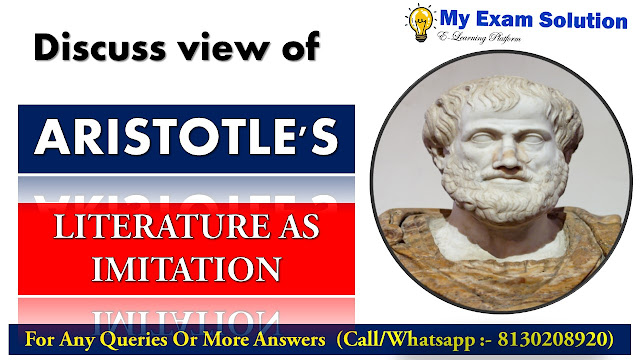Discuss Aristotle's view of literature as imitation
Aristotle, in his Poetics, presents the idea that literature,
specifically poetry, is an imitation of reality. He believed that literature is
an imitation of life, and that its purpose is to provide a representation of
the world, to depict the actions and characters of human beings, and to reveal
the emotions and thoughts of those characters. He believed that literature is
an imitation of life, and that it is a copy of an action that is either
possible or impossible. He also believed that literature is an imitation of
reality and that it should be a faithful copy of the world as it is, rather
than a distorted or idealized version of it.
Aristotle argues that the goal of literature is to imitate
reality in order to achieve a cathartic effect on the audience, which is the
process of releasing emotions such as fear and pity. He believed that
literature should aim to replicate the world in a way that is meaningful and
impactful, rather than simply being a copy of reality. He also believed that
literature should be created with a purpose, and that it should be able to evoke
emotions in the audience, and move them to some kind of action.
Discuss Aristotle's view of literature as imitation
Aristotle's view of literature as imitation is also closely
related to his concept of mimesis, which refers to the act of representing
reality in art. According to Aristotle, the purpose of mimesis is to provide a
representation of the world that is both accurate and meaningful. He believed
that literature should imitate reality in order to reveal the truth about the
human condition and to evoke emotions in the audience.
In summary, Aristotle's view of literature as imitation is
the idea that literature, specifically poetry, is an imitation of reality. He
believed that literature should provide a faithful copy of the world as it is,
and that it should be created with a purpose, and that it
What did Aristotle said about literature?
Aristotle, in his Poetics, presents a comprehensive view of
literature and its purpose. Some of the main points that Aristotle made about
literature include:
Literature is an imitation of reality: Aristotle believed
that literature, specifically poetry, is an imitation of reality. He believed
that literature is an imitation of life, and that its purpose is to provide a
representation of the world, to depict the actions and characters of human
beings, and to reveal the emotions and thoughts of those characters.
The goal of literature is to achieve a cathartic effect:
Aristotle believed that the goal of literature is to imitate reality in order
to achieve a cathartic effect on the audience, which is the process of
releasing emotions such as fear and pity. He believed that literature should
aim to replicate the world in a way that is meaningful and impactful, rather
than simply being a copy of reality.
Literature should be created with a purpose: Aristotle
believed that literature should be created with a purpose, and that it should
be able to evoke emotions in the audience, and move them to some kind of
action.
The concept of mimesis: Aristotle's view of literature as
imitation is closely related to his concept of mimesis, which refers to the act
of representing reality in art. According to Aristotle, the purpose of mimesis
is to provide a representation of the world that is both accurate and
meaningful.
Tragedy as the highest form of literature: Aristotle believed
that tragedy is the highest form of literature, because it is able to evoke the
strongest emotions of fear and pity in the audience, and this leads to
catharsis. He also believed that tragedy should have a specific structure and
should be composed of certain elements such as plot, character, diction, music,
and spectacle.
These are some of the main points that Aristotle made about
literature, but it is important to note that his view is complex and
multifaceted, and there are many other elements of his theory that are not
covered in this brief summary.
What is the concept of imitation?
The concept of imitation, also known as mimesis, refers to
the act of representing or mimicking reality in art, literature, and other
forms of expression. It is the representation of the world, the actions and
characters of human beings, and the emotions and thoughts of those characters
in literature and art.
Imitation can take different forms such as imitation of
nature, human behavior, emotions, and thoughts. The concept of imitation has
been discussed by many philosophers, literary theorists, and artists throughout
history, and it has been used to describe the relationship between art and
reality.
In literature, imitation refers to the representation of
reality through language, and it is considered a fundamental aspect of the
artistic process. It is the way in which literature represents the world, and
it is the means by which literature conveys meaning.
In art, imitation refers to the representation of reality
through visual means, such as painting, sculpture, and other forms of art. It
is the way in which art represents the world, and it is the means by which art
conveys meaning.
In summary, the concept of imitation refers to the act of
representing or mimicking reality in art, literature, and other forms of
expression. It is the way in which art and literature represent the world, and
it is the means by which they convey meaning.
ALSO READ:-
Write a critical note on the ideology of Puritanism reflected in American literature
FOR Solved PDF of Answers
Contact - 8130208920








0 comments:
Note: Only a member of this blog may post a comment.